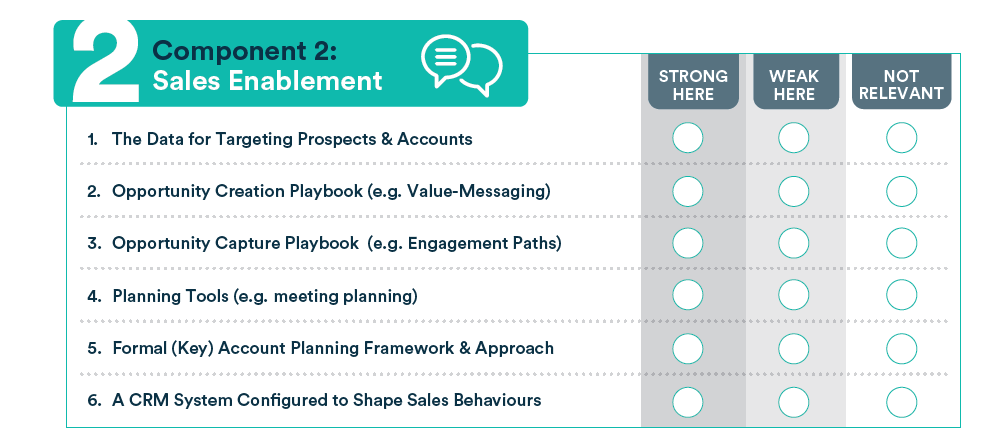- Supports
- About
-
News and Events
News and Events
Events
How can we help?
Building the Sales System – Sales Enablement
17th
October 2023
By Michael McGowan
In Part 1 of Building the Sales System we looked at the measurement component. To deliver on sales targets and deadlines, your company’s sales system needs an enablement component. “Sales Enablement” houses the messaging, tools and methodologies needed to support customer engagement and operate the pipeline and forecasting system. Today, many more sales organisations are producing enablement support through a formal sales playbook, something that only very large, mature sales forces would have used in the past.
Sales Enablement Checklist [Download]
Data: What data will be needed to target prospects and accounts? Traditionally salespeople were pretty much left to their own devices to figure out who to target, even to the point of collating their own data such as telephone numbers and email addresses. While a salesperson should be involved in this work, it is usually more productive to delegate it to marketing or a third party. That way the manager can supervise both the quality of the data and the qualification of leads and targets.
Opportunity Creation Playbook: This is the most challenging part of sales enablement and execution. This playbook prescribes how to qualify, reach out to and attract sweet spot targets in terms of companies and personas. Some of the most critical selling skills come into play here such as creating a prospect contact and nurture cadence, value-messaging and securing the first scheduled engagement with new prospects or, new contacts at an existing account.
Opportunity Capture Playbook: This prescribes your company’s process for engaging with prospects and customers once an opportunity has been created, and for bringing the opportunity to closed. It includes more value-messaging, the discovery and exploration process, the engagement roadmap, solution approaches, negotiation, closure and moving to the post-sale stage, such as account management.
Both the opportunity creation and capture playbooks should be prescriptive, using this principle; everyone saying the same thing in their own words. Some companies now use formal sales methodologies such as MEDDIC, Sandler or Challenger Selling and this will need to be included in the sales playbook, if only at a framework level.
Planning Tools: Tools in the tools-of-the-trade sense are relatively new to the sales world, but are becoming an important support for professional salespeople who practice a structured and transparent approach to selling. They include qualification, messaging, meeting planning and opportunity diagnosis templates and checklists. Another example would be call preparation and etiquette checklist for conducting a remote online meeting. This might seem like an inconsequential item, but most deals are created, captured and closed across a small number of scheduled engagements and there is no room for error. It all went well except the slide deck froze is the sort of thing conversations crumble on.
Key Account Planning Framework: Key account management can easily be treated as glorified customer service. Of all the knowledge areas in sales, account planning has in fact, the most tested methodologies and frameworks for classifying key accounts, building account data and developing account strategies and plans. One of the goals of formal account planning and management is to decide which accounts to invest in and how to build out relationships with key stakeholders and deliver value that attracts either a premium and / or secures customer retention. If you are in a SaaS or related business, your account planning approach will likely include a land and expand plan.
CRM Tool: Not too long ago – less than ten years – a CRM system would have been a nice-to-have tool for a sales team. CRMs have developed from being data logging tools to being a key part of the sales stack, along with data tools such as LinkedIn Navigator. Sales organisations need to see a CRM tool as more than a technical toy. Properly configured, a modern CRM can help the manager shape the whole team’s approach to accountability, measurement, review, planning, forecasting and execution. A good example is the use of project management methodologies and tools such as Kanban to manage the sales pipeline and forecasting process and which are now available in all the mainstream CRM tools.
Michael McGowan is Co-Founder of Smart Sales Talent Group. Michael has extensive international sales and sales management experience, and has worked with global sales organisations in the U.S.A., U.K., Europe and Asia. He has been a prime contributor on the Enterprise Ireland International Selling Programme since 2006 and hundreds of successful Irish companies selling globally, use his sales system based on DEI sales model.


